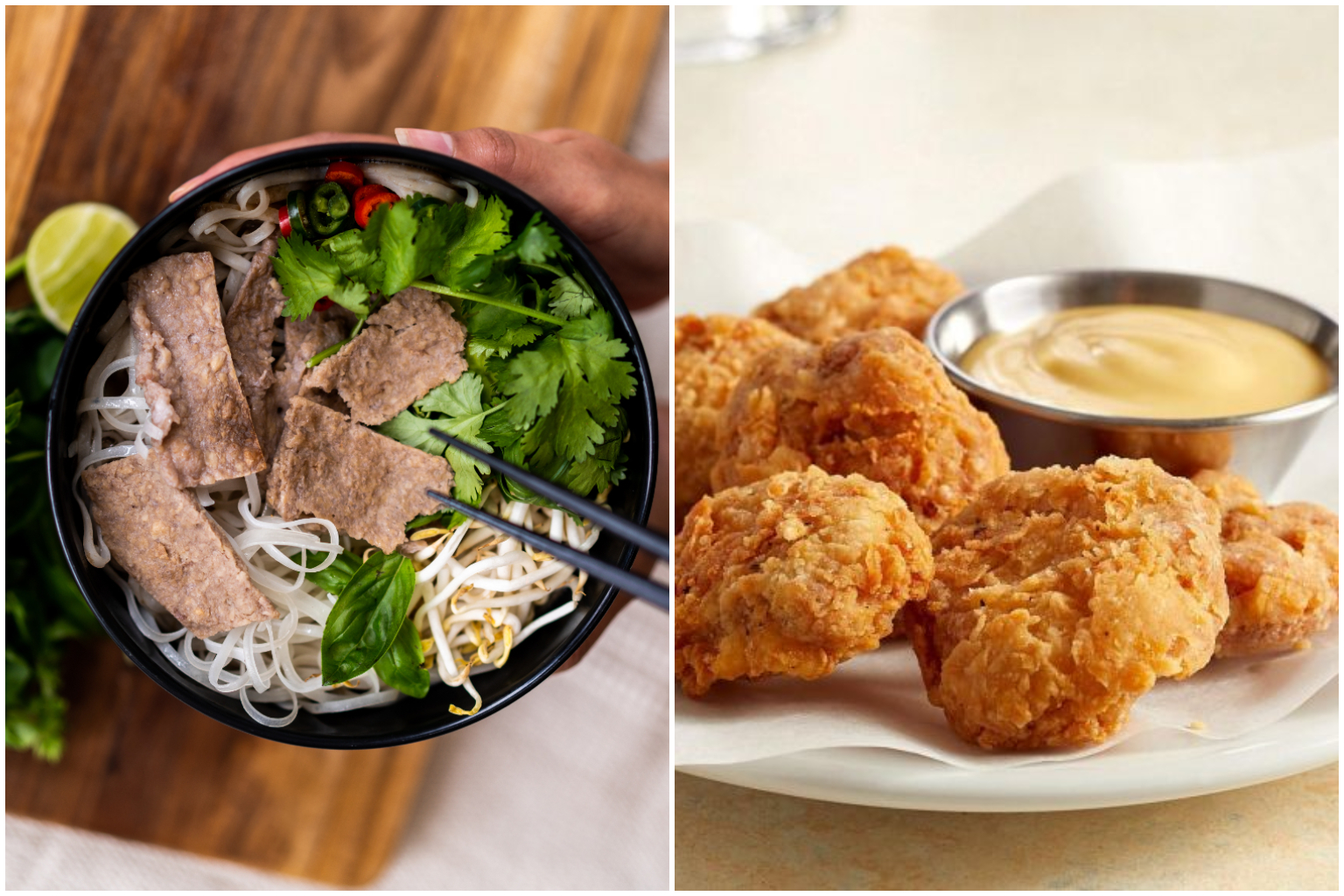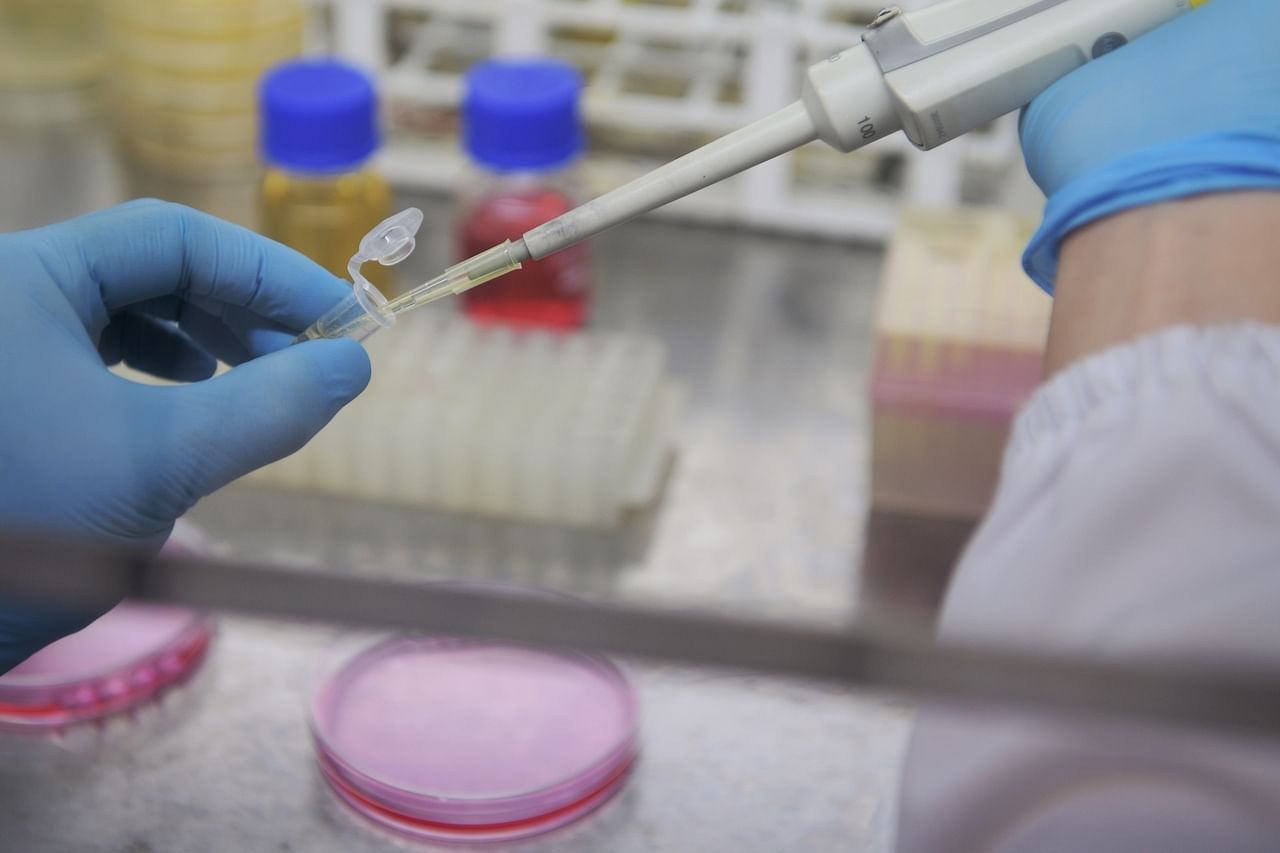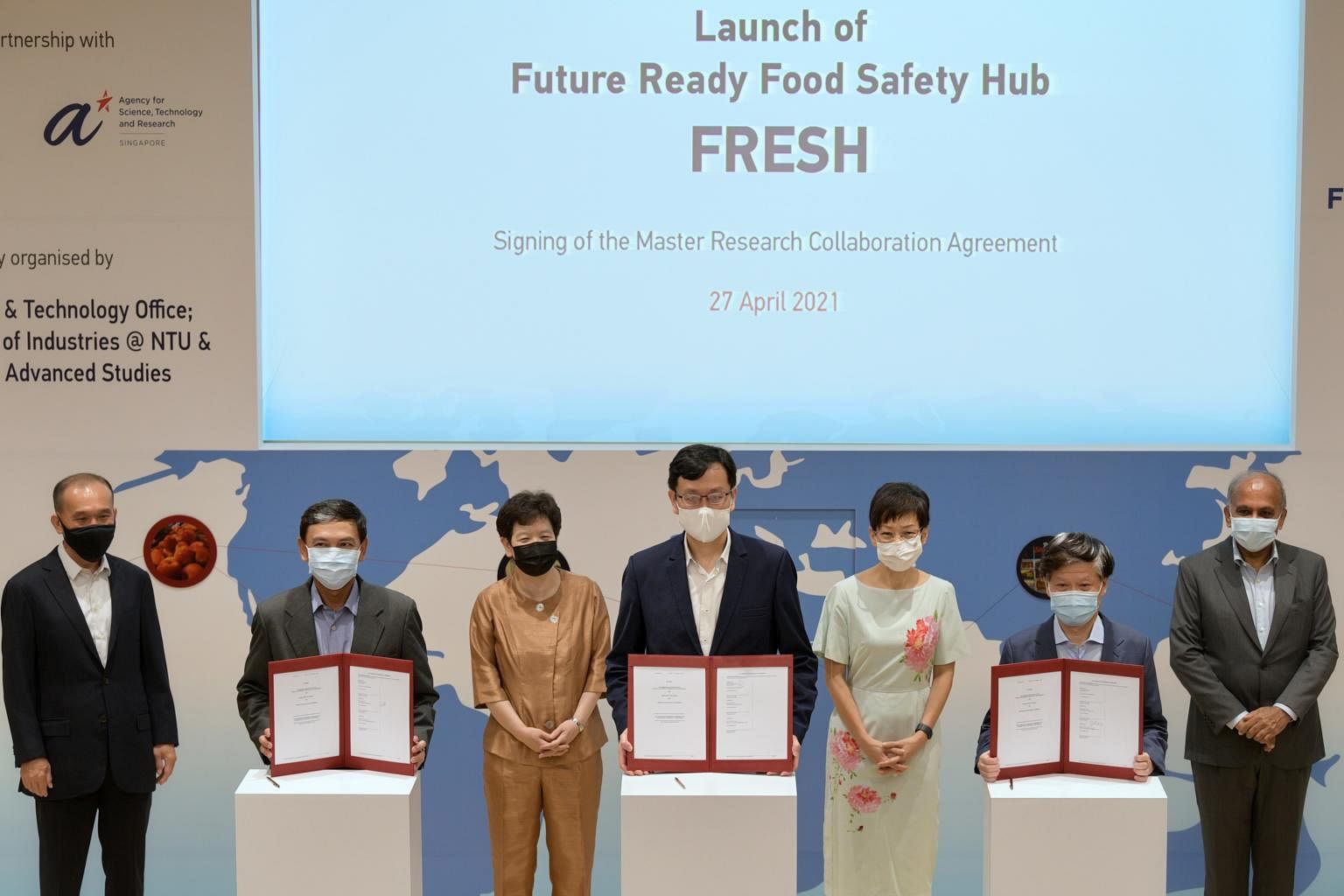New hub at NTU will study safety of novel foods
Sign up now: Get ST's newsletters delivered to your inbox

Gaia Foods' first structured beef prototype, served with rice noodles (left), and bite-sized cultured chicken by Californian start-up Eat Just.
PHOTOS: GAIA FOODS, COURTESY OF EAT JUST
SINGAPORE - From cell-based steaks to algae shakes, farms of the future here are developing novel foods to replace meat. First, however, these sustainable proteins must be judged safe to eat.
This is the idea behind a research hub launched at Nanyang Technological University (NTU) on Tuesday (April 27).
Sustainable proteins could provide the island nation with a reliable long-term source of food - as long as they are safe.
"No food safety, no food security," said Professor William Chen, director of the university's Food Science and Technology programme.
The new Future Ready Food Safety Hub will support local and overseas agri-food companies by studying new ways to assess food safety risks in novel foods, while keeping abreast of newer, emerging forms of food.
To help these companies get their food products approved and on grocery shelves and menus sooner, the scientists at the hub are working to develop protocols for novel foods, ingredients and new food-processing techniques.
Prof Chen, who will be the principal investigator for NTU at the hub, noted that no risk assessment framework has been set up so far here to evaluate the safety of many novel foods that are emerging. This is the gap that the research hub wants to fill.
"With the increasing efforts in building our food security, more and more novel foods from the urban areas would emerge, from land-based aquaculture to cultivated meat. It is therefore important to establish a proper food safety framework before the foods are available on consumers' dining plates," said Prof Chen.
For instance, the hub will conduct tests to figure out if it is safe to store alternative proteins in biodegradable packaging made from prawn shells.
He added that food technology companies can contact the hub for consultancy work and research collaborations, and to prepare for regulatory assessments.
The food safety hub was established in collaboration with NTU, the Singapore Food Agency (SFA), and the Agency for Science, Technology and Research (A*Star).
It was launched by Minister for Sustainability and the Environment Grace Fu on Tuesday, at the opening ceremony of NTU's inaugural Food Science and Technology Global 2021 conference.
Noting that food safety is more critical for future foods that do not have a history of consumption, Ms Fu said: "When it became clear to us that novel foods such as cultured meat could be an emerging growth area, SFA started engaging the scientific community and industry on the possible approaches to regulate the safety of novel foods and ingredients."

A toxicology test being conducted at NTU FST lab.
PHOTO: ST
In 2019, SFA introduced a novel food regulatory framework, which requires companies to go through pre-market safety assessment for food products that do not have a history of being eaten as food.
The agri-food sector burgeoned in 2019, as Singapore set out its "30 by 30" goal to produce 30 per cent of its nutritional needs by 2030. At the same time, interest began to grow in plant-based meat alternatives.
Enterprise Singapore said over the past two years, more than 15 alternative protein start-ups have set up base in Singapore, and that their products include plant-based protein, as well as fermented and cultured meat.
In December last year, Singapore became the first country to approve the sale of a cell-based meat, cultured chicken bites by Californian firm Eat Just.
Dr Benjamin Smith, the food safety hub's director, said knowing how to address the allergens in new proteins and the benefits and health concerns of certain compounds are some of the key gaps in addressing the safety of novel foods.

Minister for Sustainability and the Environment Grace Fu (third from right) at NTU's Food Science and Technology Global 2021 conference on April 27, 2021.
ST PHOTO: NG SOR LUAN
"We also need to have frameworks that not only look at the risks of such foods, but also allow us to bring beneficial foods on the market and weigh that risk against those benefits," added Dr Smith, who is also the director of food safety at A*Star's Singapore Institute of Food and Biotechnology Innovation.
The food safety hub will also act as a bridge between food-tech firms and consumers to raise awareness and increase the public's receptiveness towards novel foods.
Prof Chen said this will be done through public outreach programmes and school workshops on growing cell-based meat, for example.

Ms Fu said: "This will help consumers better understand the safety and benefits of certain types of novel foods, as well as emerging food safety risks. With this knowledge, consumers will be better equipped to make informed choices."
The food safety hub - housed in NTU's School of Chemical and Biomedical Engineering - is currently working with several local and overseas start-ups that are developing novel foods and alternative proteins, said an NTU spokesman. The hub is also in talks with high-tech aquaculture firms and vertical farms.
TurtleTree Labs - a start-up that uses cells to make milk without the need for cows - participated in the hub's study on consumer risk perception, and will be entering into a research agreement with it.
"The cell-based food industry is in its infancy and the regulations around it are still evolving. We have yet to understand the depth of safety assessment needed by the governing bodies for approval of our products, and we hope (the hub) would be able to help us in these areas," said TurtleTree Labs co-founder Lin Fengru.
Mr Eugene Wang, chief executive of Sophie's Bionutrients, which develops protein flour using microalgae, said: "Food safety issues have become a lot more complicated now due to the impact of global warming on the supply chain, and the increasing amounts of chemicals and genetic technologies used in various foods."


